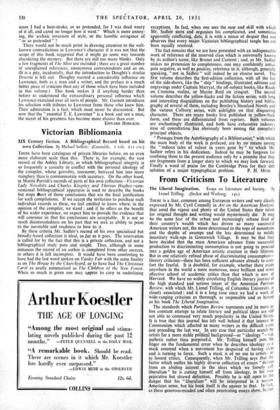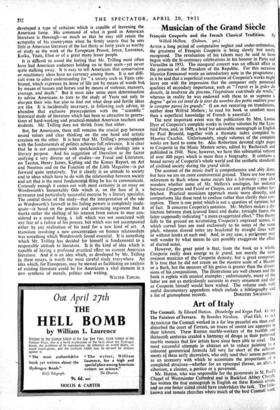From Criticism To Literature
The Liberal Imagination. Essays on Literature and Society. By
Lionel Trilling. (Seeker and Warburg. is.)
THERE is a fear, common among European writers and very clearly expressed by Mr. Cyril Connolly in Art on the American Horizon, that amid the vigour and plenty of the United States their talent for original thought and writing would mysteriously die: It may be the same fear of the urban and increasingly urbane fruit of their country's wealth which has driven so many successful American writers out, the more determined to the tops of mountains and the depths of swamps and the less determined to mildly insanitary walk-ups in Greenwich Village. It may be that they have decided that the mass American advance from successful production to discriminating consumption is not going to proceed into a golden age of -American artistic creation in their lifetime. But in one relatively refined phase of discriminating consumption— literary criticism—there has been sufficient advance already to com- fort the fearful. It is doubtful, for example, whether there exists anywhere in the world a more numerous, more brilliant and more effective school of academic critics than that which is now at Harvard. We have no widely circulating English literary journal of the high standard and serious intent of the American Partisan Review, with which Mr. Lionel Trilling, of Columbia University, is closely associated ; and it is a long time since we had a work of 'wide-ranging criticism as thorough, as responsible and as honest as his book The Liberal Imagination.
The standards which Partisan Review represents and its more or less constant attempt to relate literary and political ideas are still not able to command very much popularity in the United States. It is true that this journal has left well behind it that interest in Communism which affected so many writers in the difficult years just preceding the last war. In any case that particular search by artists for a more stable political background—or " ideology "—was pathetic rather than purposeful. Mr. Trilling himself puts his fifiger on the fundamental error when he describes ideology as a mask assumed when a movement has despaired of having ideas and is turning to force. Such a mask is of no use to artists—or to honest critics. Consequently, when Mr. Trilling says that the factor which unifies his highly diverse collection of essays "derives from an abiding interest in the ideas which we loosely call liberalism " he is cutting himself off from ideology. in his own pejorative but shrewd definition. Possibly he is still open to the danger that his "liberalism" will be interpreted in a narrow American sense, but his book itself is the answer to that. In fact, as these generous-minded and often penetrating essays show, he has
developed a type of criticism which is capable of leavening the American lump. His command of what is good in American literature is thorough—so much so that he may still retain the sympathy of his countrymen when he firmly asserts that he sees little in American literature of the last thirty or forty years as worthy of study as the work of the Europeans Proust, Joyce, Lawrence, Kafka, Yeats, Eliot or of a great many lesser people.
It is difficult to avoid the feeling that Mr. Trilling must often have had American audiences holding on to their seats—yet never quite stalking away. It is easy to tell Americans that conservative or reactionary ideas have no currency among them. It is not diffi- cult even to admit understanding for " a society such as Yeats cele- brated, which expresses its tense of life not by means of words but. by means of houses and horses and by means of violence, manners, courage, and death." But it must take some stern determination to advise Americans to turn to the study of Yeats not only to sharpen their wits but also to find out what deep and fertile ideas are like. It is incidentally necessary, in following such advice, to abandon that exclusive preoccupation with the " scientific " historical study of literature which has been so attractive to genera- tions of hard-working and practical-minded American teachers and students. Mr. Trilling does not shrink from that either.
But, for Americans, there still remains the crucial gap between sound values and clear thinking on the one hand and artistic creation on the other. It is here that Mr. Trilling's preoccupation with the fundamentals of politics achieves full relevance. It is clear that he is not concerned with spatchcocking an ideology into a literary purpose. And his suggestion of liberalism as the factor unifying a very diverse set of studies—on Freud and Literature, on Tacitus, Henry James, Kipling and the Kinsey Report, on Art and Neurosis and on the Function of the Little Magazine—is put forward quite tentatively. Yet it clearly is an attitude to society and to ideas which have to do with the relationship between society and art that is the most fundamental thing he has to communicate. Curiously enough it comes out with most certainty in an essay on Wordsworth's Immortality Ode which is, on the face of it, a strenuous and particularly successful exercise by a literary specialist. The central thesis of the study—that the interpretation of the ode as Wordsworth's farewell to his failing powers is completely inade- quate—is based on the positive and convincing argument that it marks rather the shifting of his interest from nature to man con- sidered as a moral being, a hift which was not associated with any fear of a failure of his powers, but which was not accompanied either by any realisation of his need for a new kind of art. A transition involving a new concentration on human relationships was something which Wordsworth found essential. It is something which Mr. Trilling has decided for himself is fundamental to a responsible attitude to literature. It is the kind of idea which is capable of having a profound practical effect on current American literature. And it is an idea which, as developed by Mr. Trilling in these essays, is worth the most careful study everywhere. An idea which, for Europeans. may be viewed as facilitating an analysis of existing literature could be for Americans a vital element in a new synthesis of morals, politics and writing.
WALTER TAPLIN.



































 Previous page
Previous page